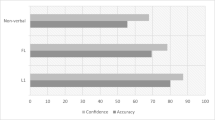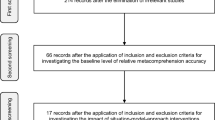Abstract
Research on the influence of subject matter setting on comprehension monitoring by secondary school students is reported in this article. Subjects were led to believe that they were reading passages from a science textbook in a science class or, alternatively, from a newspaper in a language class. Comprehension monitoring was expected to diminish in a situation in which information was acquired from a scientific source, in a science class, when compared to a situation in which information was acquired from a less authoritative source, like a newspaper, in a language class. Comprehension monitoring was measured by analyzing subjects' responses to a questionnaire and their written recall of several contradictory texts. Contrary to what was expected, evaluation and regulation of comprehension increased in the science setting. It was concluded that comprehension monitoring is dependent on subject matter setting, and that science education has a beneficial effect on this variable.
Résumé
Cet article rend compte de l'influence du contexte des connaissances sur leur compréhension par des élèves du second degré. Un même texte était présenté soit dans un manuel scolaire étudié en cours de sciences physiques, soit comme un extrait de presse étudié en cours de langue. Par hypothèse l'effort de compréhension devait être moindre quand l'information était supposée provenir d'une source scientifique que quand elle était attribuée à une source moins experte. Le travail de compréhension était mesuré au moyen d'un questionnaire et du rappel écrit de différents textes contradictoires. A l'inverse de ce qui était attendu le niveau et la régulation de la compréhension se sont avérés supérieurs dans le contexte scientifique. Les auteurs concluent que l'effort pour comprendre dépend du contexte de présentation du contenu et que l'éducation scientifique a un effet positif sur cette variable.
Similar content being viewed by others
References
Ackerman, B.P. (1986). Children's sensitivity to comprehension failure in interpreting a nonliteral use of an utterance.Child Development, 57, 485–497.
Alvermann, D., & Hynd, C. (1989, November).The Influence of Dicussion and Text on the Learning of Counterintuitive Science Concepts. Paper presented at the annual meeting of the National Reading Conference, Austin, TX.
Ames, C., & Archer, J. (1988). Achievement goals in the classroom: Students' learning strategies and motivation processes.Journal of Educational Psychology, 80, 260–287.
Baker, L. (1979). Comprehension monitoring: Identifying and coping with text confusions.Journal of Reading Behavior, 11, 363–374.
Baker, L. (1985a). How do we know when we don't understand? Standards for evaluating text comprehension. In D.L. Forrest-Pressley, G.E. Mackinnon, T.G. Waller (Eds.),Metacognition, cognition and human performance (pp. 155–205). New York: Academic Press.
Baker, L. (1985b). Differences in the standards used by college students to evaluate their comprehension of expository prose.Reading Research Quarterly, 22, 297–313.
Baker, L. (1989). Developmental change in readers' responses to unknown words.Journal of Reading Behavior, 21, 241–260.
Baker, L., & Anderson, R.I. (1982). Effects of inconsistent information on text processing: Evidence for comprehension monitoring.Reading Research Quarterly, 17, 281–294.
Brown, A., Armbruster, B., & Baker, L. (1986). The role of metacognition in reading and studying. I In J. Orasanu (Ed.),Reading Comprehension: From research to practice (pp. 49–75). Hillsdale, NJ: Lawrence Erlbaum
Brown, A.L., Bransford, J.D., Ferrara, R.A., & Campione, J.C. (1983). Learning, remembering, and understanding. In J.H. Flavell & E.M. Markman (Eds.),Handbook of child psychology. vol. 3. Cognitive development (pp. 77–166). New York: Wiley.
Brown, A.L., Campione, J.C., & Day, J.D. (1981). Learning to learn: On training students to learn from text.Educational Researcher, 10, 14–21.
Brunkhorst, B.J. (1992). A study of student outcomes and teacher characteristics in exemplary middle and junior high science programs.Journal of Research in Science Teaching, 29, 571–583.
Cuerva, J., & Otero, J. (1995, September).Análisis del conflicto cognitivo en la adquisición de información cientifica inconsistente con el conocimiento previo. Paper presented at 5o Encuentro Ibérico para la enseñanza de la Física, Santiago de Compostela, Spain.
Ericsson, K., & Simon, H. (1980). Verbal reports as data.Psychological Review, 87, 215–251.
Garner, R. (1990). When children and adults do not use learning strategies: Toward a theory of settings.Review of Educational Research, 60, 517–529.
Garner, R., & Anderson, J. (1982). Monitoring of understanding research: Inquiry directions, methodological dilemmas.Journal of Experimental Education, 50, 70–76.
Garner, R., & Kraus, C. (1981–82). Good and poor comprehenders' differences in knowing and regulating reading behaviors.Educational Research Quarterly, 6, 5–12.
Glenberg, A.M., & Epstein, W. (1985).Calibration of comprehension.Journal of Experimental Psychology, 11, 702–718.
Glenberg, A.M., & Epstein, W. (1987).Inexpert calibration of comprehension.Memory and Cognition, 15, 84–93.
Glenberg A.M., Wilkinson A.C., & Epstein, W. (1982). The illusion of knowing: Failure in the self-assessment of comprehension.Memory and Cognition, 10, 597–602.
Grabe, M., Antes, J., Kahn, H., & Kristjanson, A. (1991). Adult and adolescent readers' comprehension performance: An investigation of monitoring accuracy and related eye movements.Contemporary Educational Psychology, 16, 45–60.
Grossman, P.L., & Stodolsky, S.L. (1995). Content as context: The role of school subjects in secondary school teaching.Educational Researcher, 24, 5–11.
Guzzetti, B.J., Snyder, T.E., Glass, G.V., & Gamas, W.S. (1993). Promoting conceptual change in science: a comparative meta-analysis of instructional interventions from reading and science education.Reading Research Quarterly, 28, 117–159.
Hopkins, K.D., Stanley, J.C., & Hopkins, B.R. (1990).Educational and Psychological Measurement and Evaluation, Englewood Cliffs, NJ: Prentice Hall.
Hynd, C.R., & Alverman, D.E. (1989): Overcoming misconceptions in science: An on-line study of prior knowledge activation.Reading Research and Instruction, 28, 12–26.
Kroll, M.D., & Ford, M.L. (1992). The illusion of knowing error detection and mitovational orientations.Contemporary Educational Psychology, 17, 371–378.
Lightfoot C., & Bullock M. (1990). Interpreting contradictory communications: Age and context effects.Developmental Psychology, 26, 830–836.
Markman, E.M. (1977). Realizing that you don't understand: A preliminary investigation.Child Development, 46, 986–992.
Markman, E.M. (1979). Realizing that you don't understand: Elementary school children's awareness of inconsistencies.Child Development, 50, 643–655.
Markman, E.M., & Gorin, L. (1981). Children's ability to adjust their standards for evaluating comprehension.Journal of Educational Psychology, 73, 320–325.
Meichtry, Y.J. (1993). The impact of Science curricula on student views about the nature of science.Journal of Research in Science Teaching, 30, 429–443.
Mosenthal, P. (1979). Children's strategy preferences for resolving contradictory story information under two social conditions.Journal of Experimental Child Psychology, 28, 323–343.
Neuberg, S.L., & Newsom, J.T. (1993) Personal need for structure: Individual differences in the desire for simple structure.Journal of Personality and Social Psychology, 65, 113–131.
Nisbett, R., & Wilson, T.D. (1977). Telling more than we know: Verbal reports on mental processes.Psychological Review, 84, 231–259.
Nissani, M., & Hoefler-Nissani, D.M. (1992). Experimental studies of belief dependence of observations and of resistance to conceptual change.Cognition and Instruction, 9, 97–111.
Nolen, S.B. (1988). Reasons for studying: Motivational orientations and study strategies.Cognition and Instruction, 5, 269–287.
Otero, J. (1987). Comprehension monitoring in learning from scientific text. In J.D. Novak (Ed.),Proceedings of the Second International Seminar on Misconceptions and Educational Strategies in Science and Mathematics (pp. 370–375). Ithaca, New York: Cornell University.
Author information
Authors and Affiliations
Rights and permissions
About this article
Cite this article
García-Arista, E., Campanario, J.M. & Otero, J. Influence of subject matter setting on comprehension monitoring. Eur J Psychol Educ 11, 427–441 (1996). https://doi.org/10.1007/BF03173282
Received:
Revised:
Issue Date:
DOI: https://doi.org/10.1007/BF03173282




